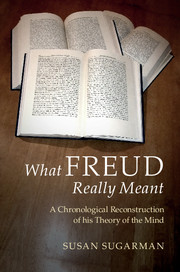Book contents
- Frontmatter
- Dedication
- Contents
- Acknowledgments
- Introduction
- 1 Freud on psychoanalysis: Five Lectures on Psychoanalysis (1909a)
- 2 The pleasure and reality principles: “Formulations regarding two principles in mental functioning” (1911); “The psychology of the dream-processes” from The Interpretation of Dreams” (1900)
- 3 Ambivalence and the origin of the civilized mind: “Taboo and emotional ambivalence” from Totem and Taboo (1913b)
- 4 Narcissism as a stage in development: “On narcissism: an introduction” (1914)
- 5 The impetus to the mind: “Instincts and their vicissitudes” (1915a)
- 6 The possibility of repression: “Repression” (1915b); “Negation” (1925a)
- 7 The unconscious and the structure of the mind: “The unconscious” (1915c)
- 8 Beyond the pleasure principle: Beyond the Pleasure Principle (1920)
- 9 A new architecture of the mind: The Ego and the Id (1923)
- 10 Pleasure revised: “An economic problem in masochism” (1924)
- 11 Civilization, morality, and the pursuit of pleasure: Civilization and its Discontents (1930)
- Epilogue: What Freud really meant
- References
- Index
11 - Civilization, morality, and the pursuit of pleasure: Civilization and its Discontents (1930)
Published online by Cambridge University Press: 05 April 2016
- Frontmatter
- Dedication
- Contents
- Acknowledgments
- Introduction
- 1 Freud on psychoanalysis: Five Lectures on Psychoanalysis (1909a)
- 2 The pleasure and reality principles: “Formulations regarding two principles in mental functioning” (1911); “The psychology of the dream-processes” from The Interpretation of Dreams” (1900)
- 3 Ambivalence and the origin of the civilized mind: “Taboo and emotional ambivalence” from Totem and Taboo (1913b)
- 4 Narcissism as a stage in development: “On narcissism: an introduction” (1914)
- 5 The impetus to the mind: “Instincts and their vicissitudes” (1915a)
- 6 The possibility of repression: “Repression” (1915b); “Negation” (1925a)
- 7 The unconscious and the structure of the mind: “The unconscious” (1915c)
- 8 Beyond the pleasure principle: Beyond the Pleasure Principle (1920)
- 9 A new architecture of the mind: The Ego and the Id (1923)
- 10 Pleasure revised: “An economic problem in masochism” (1924)
- 11 Civilization, morality, and the pursuit of pleasure: Civilization and its Discontents (1930)
- Epilogue: What Freud really meant
- References
- Index
Summary
We can at last grasp two things perfectly clearly: the part played by love in the origin of conscience and the fatal inevitability of the sense of guilt.
– S. Freud, Civilization and its Discontents, p. 132Freud's seminal Civilization and its Discontents brings still further elaboration on the oppressive internal forces he calls the superego. Those forces occasion the malaise all humans are destined to feel on account of the critical role the forces play in fostering civilized life. Their necessity derives from the unflinching dominance of the pleasure principle in our individual mental lives and the instincts upon which the pleasure principle plays. Civilization and its Discontents delivers the final refinement of these various elements of Freud's system and a crowning integration of them. En route, it takes us on a wide-ranging tour through the psyche and the history of civilization, as Freud understands them.
Freud begins the narrative proper with a documentation of the ubiquity of the human striving for happiness, which persists despite the fact that we seldom achieve it and mostly aim, also with limited success, to avoid pain; this is the program of the pleasure principle. Surmising that human relations are responsible for our suffering, he counts among the difficulties that civilization, which we rightly cherish nonetheless, requires that we restrict our possibilities for satisfaction. We have to renounce or at least redirect our instincts, and to deprive an instinct of satisfaction must occur at a great cost.
Having now identified civilization as both prize and culprit Freud asks how it arose and how it came to compromise our happiness to the degree it does. He offers that it was founded in “love and necessity,” which manifest, respectively, in the pull toward family and our pursuit of our material wellbeing, the latter enhanced by community efforts like work in common. However, given the strength with which family ties pull people away from the wider community, common interest will not hold that community together. As a result we have come to be bound also by “libidinalties” outside the family, as the precept to “love thy neighbor as thyself” exhorts.
- Type
- Chapter
- Information
- What Freud Really MeantA Chronological Reconstruction of his Theory of the Mind, pp. 129 - 149Publisher: Cambridge University PressPrint publication year: 2016



